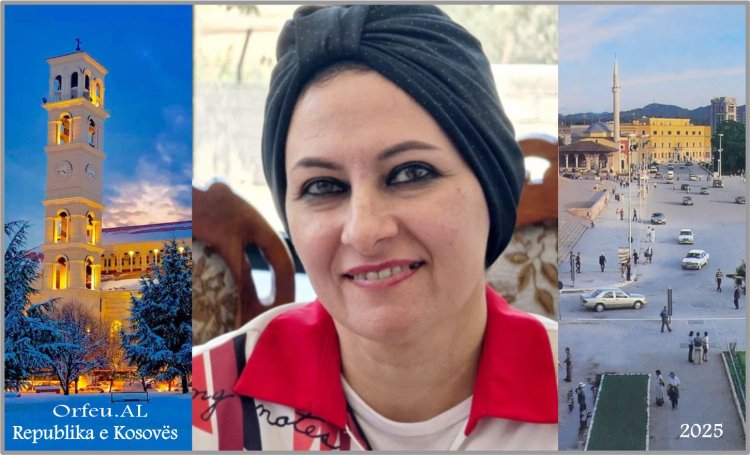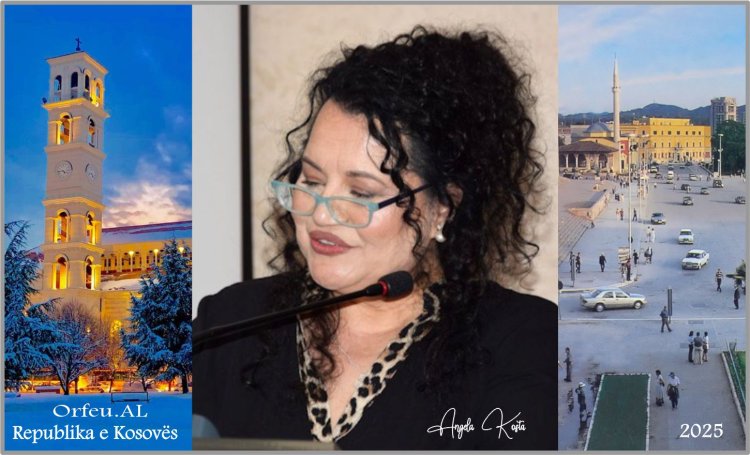MERVAT AL-KHUZAI... THE STORYTELLING BUTTERFLY THAT FLEW FROM THE SHORES OF SHATT AL-ARAB TO THE SKIES OF LITERATURE
Her entry into the realm of literature was not a quiet crossing over a bridge of words, but a dramatic storm—like the roaring of a river in flood, and much like herself. Just as Basra was born from the womb of longing and history, Mervat Al-Khuzai emerged from the light of the Shatt al-Arab—not as an ordinary writer, but as a literary phenomenon, veiled in wonder and marked with a beautiful estrangement. That strangeness which poets drape over their wounds, and writers shape into a rebellion against the world.
She did not take a conventional path to storytelling. She shed the garments of routine and approached narrative the way a butterfly approaches light—circling it, dissolving into it, and rising from its ashes as a tale. She wasn’t merely a short story writer who etched tales onto the page; she was a creature of imagination and dates, of sweet anxiety and rebellious innocence. She chose to live like a butterfly—never tiring of flight—sipping the nectar of language from its gardens, building her nest atop the branch of a story or beneath the shade of a metaphor.
She was born in Basra—a city that never dies, even when weary. A city that, once you taste its waters, lives within you forever. A city that echoes with the laments of Badr Shakir Al-Sayyab, the weeping of Gilan, the grammar of Al-Khalil, and the thunder of Al-Jahiz. In every alley beats a verse of poetry, in every palm tree, a tale. And there, beneath those palms, Mervat grew—like a sapling of literature drenched in meaning, nourished by the springs of eloquence. She listened to Basra’s poets and observed its writers as if studying the features of her ancestors.
She once described herself as “outside the bounds of the ordinary,” and her pen bears witness to that truth. Not a single line she wrote was devoid of defiance. Each story carries the scent of metaphor and the boldness of discovery. Though her academic background was in computer science, she soon realized that it is not numbers that program life—but words. So she began weaving her own cocoon of letters, emerging not as a timid insect, but as a butterfly that slapped the air with her wings.
She wrote her first collection, Silk of the Storytelling Butterfly, in 2016, as if confessing the secret of her birth: she was the butterfly, and the stories were her silk. Then came The Final Performance in 2019, and Between the Index and the Thumb in 2023—as if she were searching for meaning between the fingers of life, reshaping reality with a poetic, feminine sensibility that carried both pain and tenderness.
Mervat was never imprisoned by solitude. She contributed to collective works that bore the spirit of collaboration, such as Murals, It’s Time We Tell Our Stories, and most recently, The Postman’s Whispers—whispers that literature does not shy from, but rather embraces as hidden secrets only revealed between the lines.
She always believed that writing is not merely a mode of expression—but a way of life. She participated in many workshops, including a poetry writing workshop at the Goethe-Institute, a literary residency in Germany in 2016, and literary festivals in Tunisia and Iraq. She stood proudly on the platforms of language, declaring that woman is not a shadow in the text—but the light itself.
Not only does she write—she trains, she motivates, she plants stories in the hearts of young women writers. She earned certificates in screenwriting and creative coaching, as though preparing the next generation to carry the torch of storytelling.
To her, Basra was more than a place—it was a metaphor. Not just a spot on a map, but a poem. How could it not be, when she is the daughter of the city that taught Arabs eloquence, birthed Al-Farahidi and Al-Jahiz? The city where Al-Sayyab wrote the agony of the homeland, and where Kazem Al-Hajjaj passed through like a hot wind foretelling fire.
She was mentored by literary giants, opened the windows of her stories to the light of Mohammed Khudair, and sipped from the prose of Majid Al-Mousawi and Mahmoud Abdul Wahhab. Even after them, she remained quietly in the back rows—writing without noise, crafting wings from paper, and letting life interpret her flight.
Mervat Al-Khuzai’s journey has no end—for departure, to her, is not a severance, but a transition. A story, like a butterfly, is never truly over; just when you think it’s finished, it surprises you with another birth. She inhabits literature the way a butterfly inhabits a flower—not flying away from it, but rising through it. She hovers above tales not written by hand, but etched by a soul that refused to yield, and a mind that believed the word to be stronger than silence, and more beautiful than obedience.
In an age that storms women from every direction, Mervat stood like a lotus tree against the wind—or like a poem that refuses to be deleted.
(Writer by: Hamed Al-Dhabyani)
Prepared Angela Kosta



